RECOIL OFFGRID Preparation Bucky Pratt: A Combat Veteran’s Journey and His Mission to Share Lessons Learned
In This Article
Few people ever experience actual combat in a war. And of those who do, fewer still turn that experience into something positive. Bucky Pratt is one of these rare individuals who has faced and grappled with his inner demons instead of avoiding them or letting them consume his life. After much introspection, he has turned his passion for traveling and exploration into an example of how others may learn from his hardships.
From a young age, Bucky had a yearning to explore. Growing up in rural Oregon provided ample opportunities to roam the wilderness that he found undeniably enticing. It was a thrill to jump on a bike and pedal over the horizon to a friend’s house or grab his trusty BB gun and wander the edges of farm fields.
Early in his teens, his church provided an opportunity to go on several mission trips. Compelled to see places he had never seen, Bucky was exposed to experiences that changed the trajectory of his life forever. While traveling by bus down the West Coast of the United States to Mexico and witnessing the rich diversity of cultures along the way, Bucky became hooked.
We sat down with Bucky to ask him about what kind of lessons he’s learned about preparation and daily carry after visiting more than 20 countries around the world in less than two years.
RECOIL OFFGRID: What was the catalyst that made you start thinking about traveling the world?
Bucky Pratt: The desire to travel the world has been there since I was a small boy. I was always wondering what was over the next hill or around the bend. It’s what I wanted to do when I got out of the military, but I was not in the right headspace. Going through counseling helped me finally unload some of the burdens of repeated trauma that had been holding me hostage from pursuing what I wanted. For many of us, we have lost so many close friends, people we love. We’ve seen death. We’ve seen the worst of the world. And death is always looming. She’s patiently waiting in the corner.
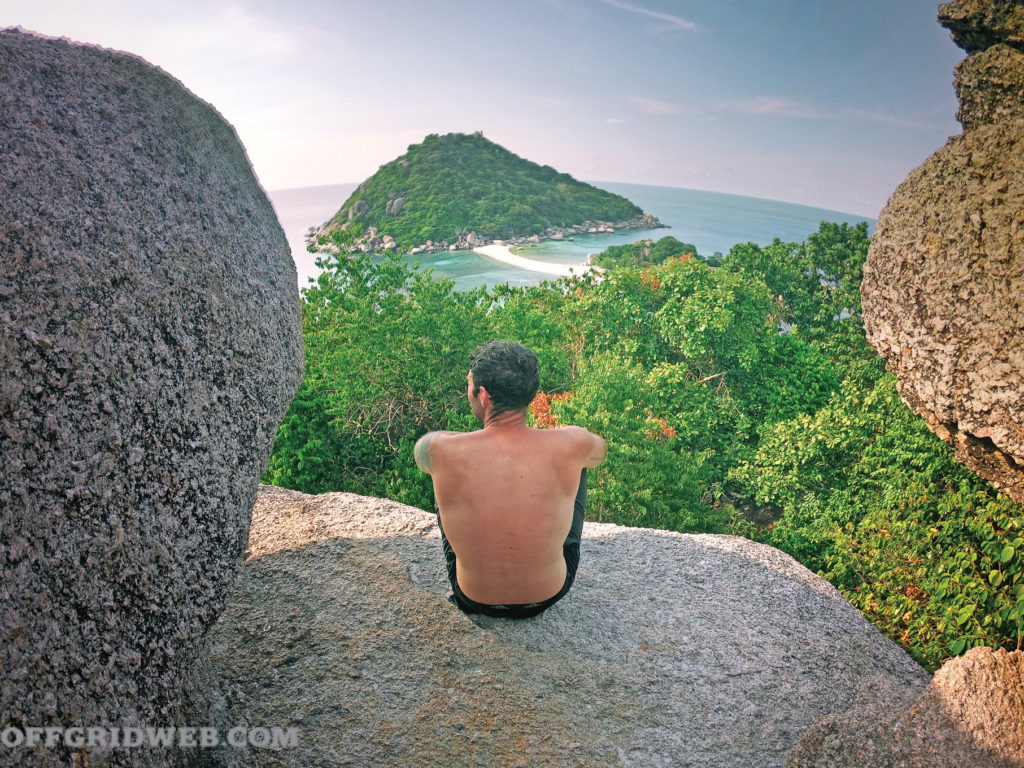 Above: Enjoying a break on the Koh Nang Yuan viewpoint after kayaking from Koh Tao, Thailand.
Above: Enjoying a break on the Koh Nang Yuan viewpoint after kayaking from Koh Tao, Thailand.
During my first deployment, my brothers and I always said, if any of us ever passed, we would live our lives in the best way we could to honor each other. I’m living this life for my brothers and knowing they would be happy to know that I’m pursuing my passion. But it just all kind of came to a point and I was like, it’s time to stop waiting. It’s time to stop putting things off. I just need to f***ing go for it. Take that leap of faith, because what’s the worst that happens? You’ve got to pick yourself up and start over. And even that is great. That was one of the best parts about the military — you’re always challenged in some way.
Why were you drawn to overseas travel instead of just exploring or living a minimalist lifestyle in the United States?
Bucky Pratt: The way I see it, I’m in my 30s, I can backpack around the world now and probably do it for several years. But at some point, I’m going to be that weird old guy who’s backpacking and staying in hostels. At that point, then I can go back to the U.S. and explore there. I’ll be older and you know, maybe my knees won’t be up to the task anymore. Maybe my back won’t be up to it. The chance to live this way abroad may never happen again, and I had to take it.
You must have made many preparations before embarking on your journey. Can you tell us what some of them were?
Bucky Pratt: I did a lot of route planning because originally my goal was to visit 55 countries in a year. I planned numerous routes, looking at maps, flight paths, difficulty of border crossings. Once I had a rough route, I dove into visa requirements — what countries I had to apply ahead of time or didn’t need a visa to enter. I was also trying to follow the seasons and prep for what I thought I would need. I took into consideration a reasonable budget. I’ve spent enough time in adverse conditions, so a slightly more forgiving budget was important.
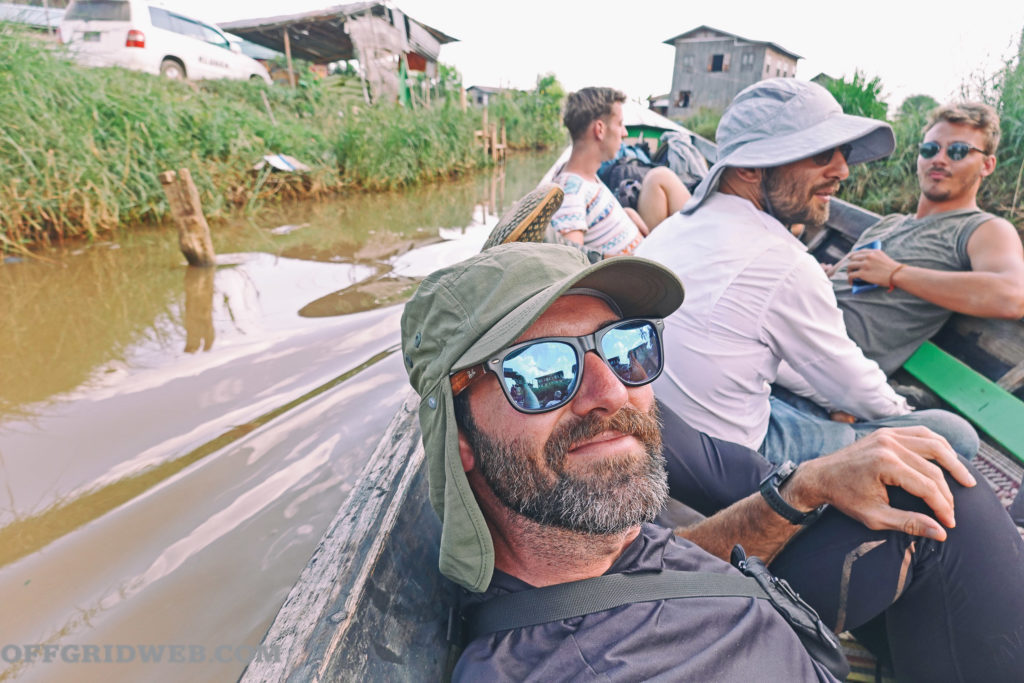 Above: Taking a longboat across Inle Lake from Kalaw, Myanmar.
Above: Taking a longboat across Inle Lake from Kalaw, Myanmar.
The importance of gear I picked up in the military always carried on with me. There was a lot of time spent picking gear for this trip. I wanted to pack light, which meant everything needed to be dual-purpose. I would go to different outdoor gear stores on the weekends. Trying on every 40- to 65-liter backpack there was, loaded with 30 pounds of weight and walk around to get a feel. If you are going to spend much time wearing gear, you want stuff that’s comfortable.
How many countries have you visited?
Bucky Pratt Twenty-three during this trip, not even half of what I set out to accomplish. After the first 14 countries there was this turning point when I said, f**k this. I was in Europe and got to the point where if I saw another castle, cathedral, or cobblestone street, I was going to lose it. And maybe that sounds pretentious to say, but Europe wasn’t the excitement I was craving. After being in a combat theatre, going to the Christmas market in Germany doesn’t sound super exciting to me.
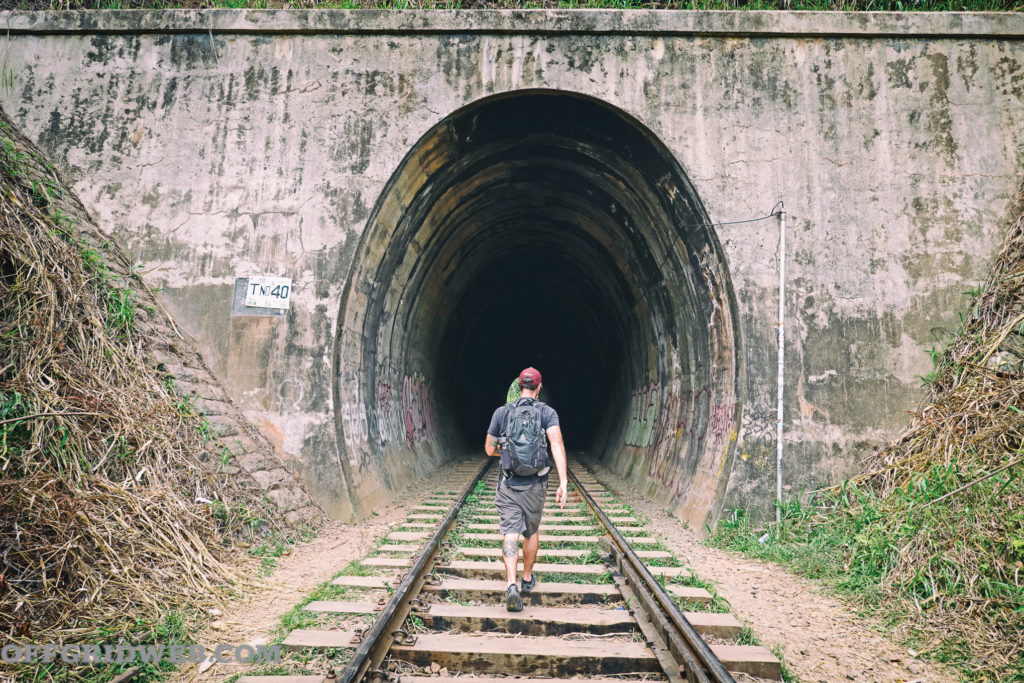 Above: Heading toward the train tunnel to the Nine Arches Bridge in Ella, Sri Lanka.
Above: Heading toward the train tunnel to the Nine Arches Bridge in Ella, Sri Lanka.
What is your traveler’s everyday carry?
Bucky Pratt: Most days I bring my day pack with me. I’m using a Gregory Miwok 18-liter. It has plenty of mileage on it and looks a little beat up. The important items — passport, first-aid kit, cash (local and USD), paracord, multi-tool, headlamp, power bank, pen, notepad, LifeStraw bottle, candy for kids, spirits for adults, tin cup, eating utensil, bottle opener, and a camera. There are other items that come and go depending on my location and what the day holds.
On my person, wallet, cash (local and USD), cell phone, knife, flashlight, and ear buds. The knife varies depending on location. In places that knives are frowned upon, I carry a small paring knife. If needed for defense, it’ll do the trick, but I can also ditch it at a moment’s notice due to security checkpoints or police.
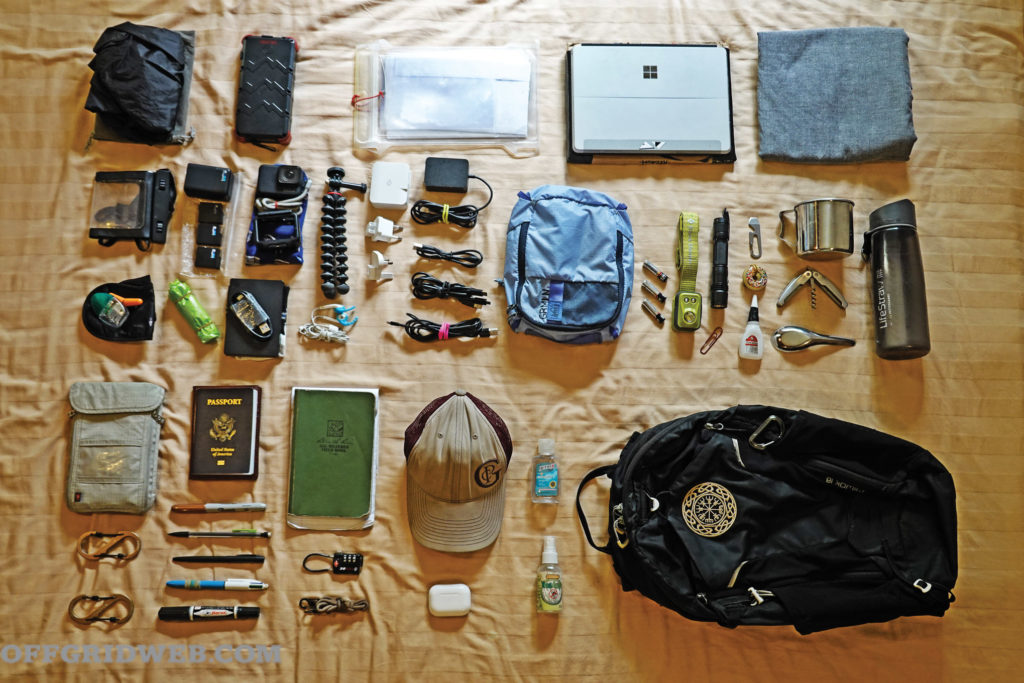
Above: Staying light on your feet while spending the day exploring a foreign country is an art. A tried-and-true 18-liter day pack holds the essentials that come in handy while reducing the bulk of larger bags.
How do you keep your first-aid kit easy to bring along?
Bucky Pratt: Typically, just Band-Aids, sterilizing pads, gauze, gloves, pressure dressing, super glue, duct tape, and a tourniquet. Also, some antibacterial or antiseptic cream and eye drops. That’s about it. I keep it fairly basic. I figure if something’s worse than that, it’s a sh*tty day, and I’ll need to seek proper medical services.
Do you find it useful to bring currency?
Bucky Pratt: That generally depends on the country I’m in and how far the money goes. Typically, I like to keep $50 to $90 worth of the local currency. I also keep a $100 in U.S. currency, because if I get in a sticky situation with the cops, $100 is a small price to pay to not end up in a jail. Sometimes slipping someone a $20 bill can get you into places that would otherwise be off-limits.
It looks like most of your backpacks and clothing are darker colors. Is there any particular reason for this?
Bucky Pratt: Yeah, I don’t like gear that is high-visibility. I like my gear dark and a little beat up. Makes me stand out a little less — anything to draw less attention is important to me. My Caucasian complexion already draws enough attention in some places. The last thing I need is a ridiculously bright bag that peacocks.
What type of gear do you keep back wherever you are resting your head?
Bucky Pratt: My main pack is a 65-liter Gregory Baltoro. I originally had bought a 55-liter bag and I was like, wow, I don’t have enough space. When I upgraded to the larger size, my goal was to have everything fit in the 65. That would include my day pack. Well, I overpacked. When you have more space, you add more stuff. I’ve gotten rid of a lot of unneeded clothing along the way. I typically go layout everything every three months and assess what I’ve been using or not using. My rule is, if I haven’t used it in 60 to 90 days, I toss it. Most simple items can be bought wherever you’re at.
S-Biners are great to have. You hang them on your backpack. They don’t take up much space, they’re lightweight and make it easy to hang your bag when you need to. They’re so small and convenient.
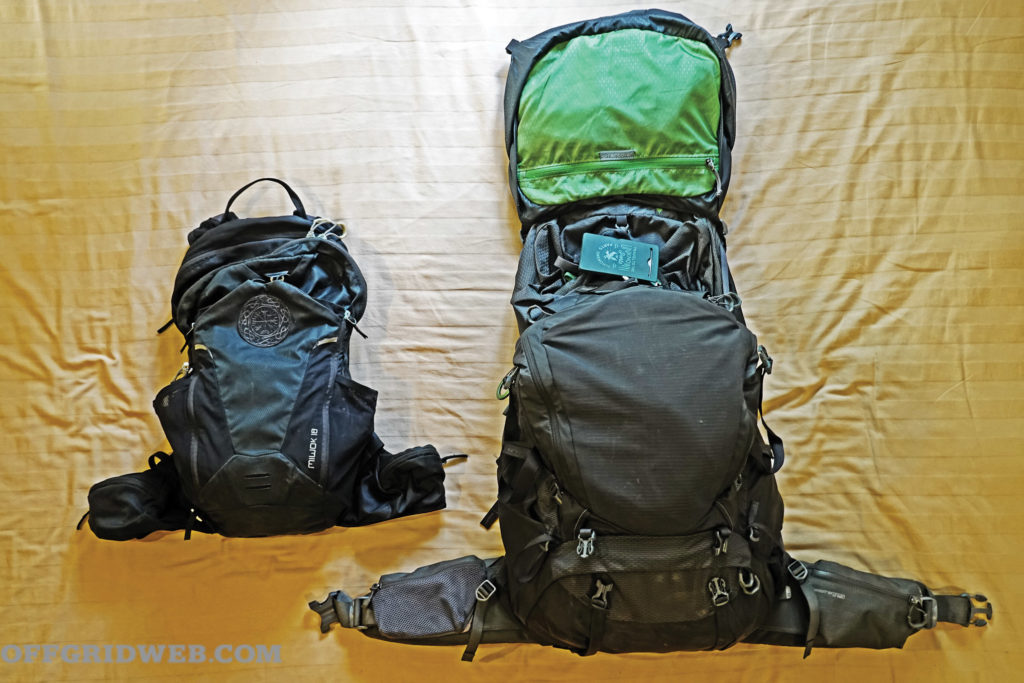
Above: Size matters! Small is great for a day pack but a 65-liter main pack will hold the gear and clothing needed for extended durations.
Packing cubes have been a game-changer. They’re fabric cubes that keep everything in place. I wish I would have had them in the military for my rucksack and sea bags. I recall numerous times going through my rucksack looking to the bottom right corner where I always kept extra whatever, but for some reason the item wasn’t in that spot. You think you know where it’s at because you always pack your bag the same. Then, you tear your bag apart. I don’t know about you, but I hated that in the military. Packing cubes are especially nice if you are staying in hostels, if you’re in a dark room, and you don’t want to use a light because you’re trying to be courteous.
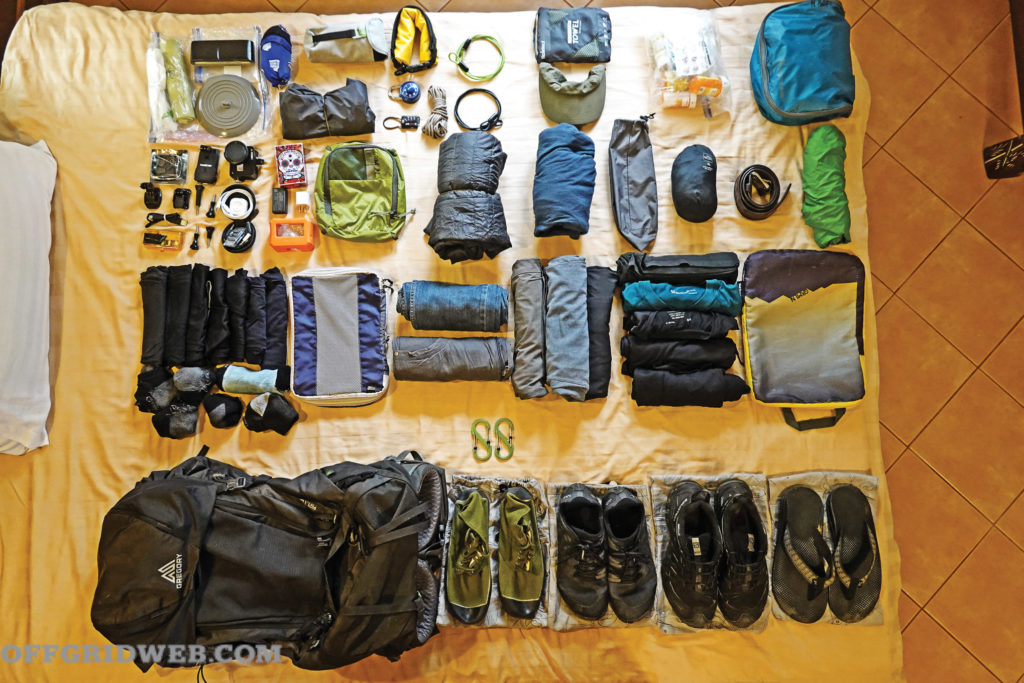 Above: Layout of the main pack contents, which includes everything necessary to reset at the end of the day and sustain months of adventure. A detailed breakdown of all the contents can be found at: grmlnglobal.com.
Above: Layout of the main pack contents, which includes everything necessary to reset at the end of the day and sustain months of adventure. A detailed breakdown of all the contents can be found at: grmlnglobal.com.
The bag I have is a top, front, and bottom load. A little bit more vulnerable in some ways, but the convenience of it is important to me. I also pack braided steel cable with me. A lot of times if I’m staying in a hostel where they don’t have lockers, or I’m on a train, I’ll take that and I’ll loop it through my backpack to avoid anyone easily snagging my bag when I’m out or asleep.
Before arriving in a new country, what are the steps you take?
Bucky Pratt: I do preparation ahead of time before I arrive to a new place. I always look up the location of the embassy or consulate. Get a local SIM card. Make a reservation at an accommodation, even if it’s just for one night. I’d rather know where I’m going for one night than show up and have no clue. I use an offline GPS map app to mark locations — that way if I can’t get a SIM card, at least I have the locations marked and I can just look at the map and figure out my route to get there. Figure out where the closest medical facility is. Look up local news, crime rates, etc. When I arrive to an accommodation, I assess the area. That includes entry/exit points of the building, security cameras, fire exits, is there staff on duty 24/7, etc. After checking in, I try to make a habit of conducting an expanding square around the accommodation.
Have you ever changed your mind about staying at a shady place?
Bucky Pratt: Yeah. There’s been times I’ve rolled up and checked around and decided it wasn’t for me. But also, when I’m doing preparation, like the cost of a place will say a lot. Now it’s not always this way, but if it’s a $3/night hostel, the chances of it being a shady place with easy access goes up. If there is a place with a higher price, I’ll pay a couple extra bucks to stay somewhere nice. But yeah, I’ll move out of area that rubs me the wrong way. Location is a big thing — if it’s off the beaten path or it’s in a spot that’s weird to get to, those are things that will make me find a different location. The area has a lot to do with it.
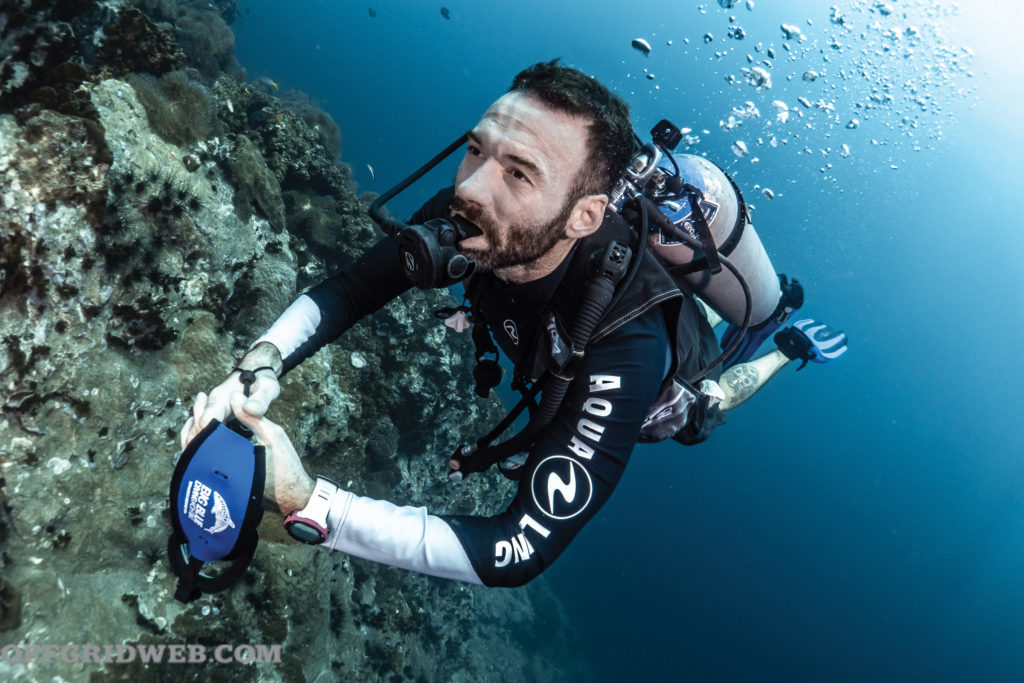 Above: Diving in the Gulf of Thailand.
Above: Diving in the Gulf of Thailand.
Another thing is the staff. If something about the staff seems off, I might change my mind about where I am staying. There have been places with signs of forced entry into the room. I stayed at this hotel in Cairo, and the door to my room looked like it had been broken into more than a few times. That place made me a little uncomfortable, but my friends picked it and I was not about to ask them to rebook. I just made sure to not leave anything of value in my room while I was gone. I usually used steel cable to secure my big bag inside of a wall cabinet. Was it super secure? No, but a slight deterrent.
After spending over a year abroad living out of your backpack, what items will you change or add on your next trip?
Bucky Pratt: I will add a couple more items to my medical kit, such as QuikClot, a quality poncho, lock pick set, counter-custody items, and a high-viz panel. You just never know when you’ll need something to get out of a sticky situation. I will also pack less overall. It’s pretty easy to get stuff anywhere in the world. It might not be the highest quality, but it’ll do the trick in a pinch.
Looking back, is there anything you think you should have added to your planning process?
Bucky Pratt: I would have planned to do less. After the first 14 countries, I was really burned out, moving too fast. Feeling rushed is not fun and you miss out on the good stuff. By slowing down you get to see more of the country you’re in. It also brings down costs a little due to less transportation cost.
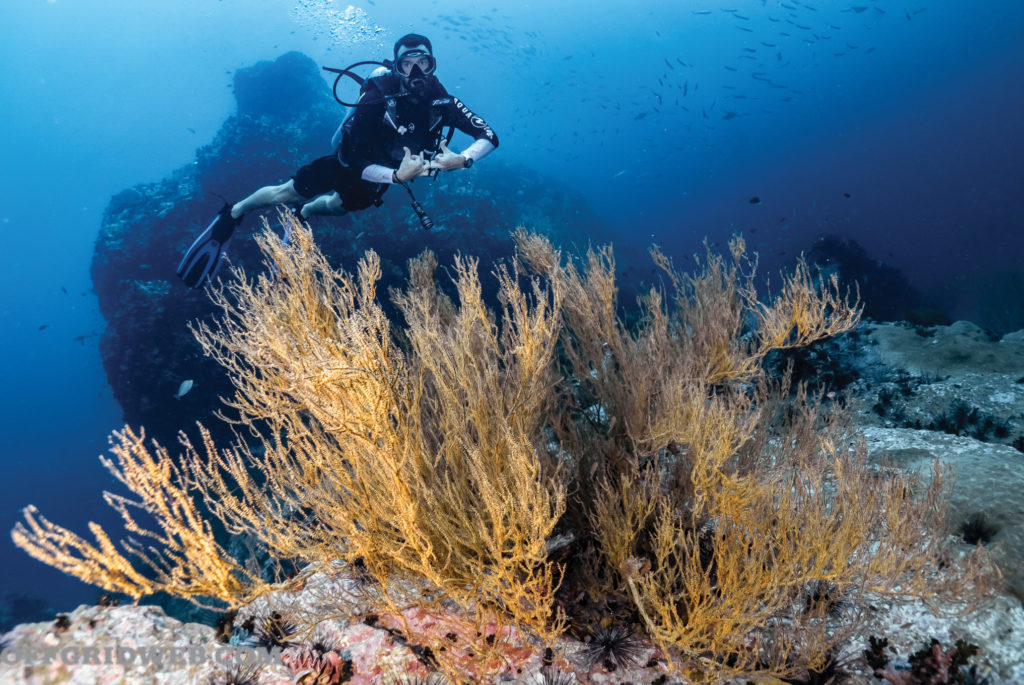 Above: Exploring the depths of the Andaman Sea.
Above: Exploring the depths of the Andaman Sea.
You’re out there in the great wide world roughing it. What are your thoughts about how average people might react taking on this kind of challenge?
Bucky Pratt: What a lot of people in society lack is challenge. Traveling like this, for me, is the kind of challenge that is meaningful. I like living out of a backpack and having very little. I enjoy exploring new places. I may be slightly uncomfortable, or in an adverse location, but it also makes me feel more alive than ever. It’s the closest I’m getting to having the adrenaline and the joys of past experiences, and I have made it a part of my road to recovery. After all my planning, it all comes together. It’s inspiring me to open more doors, you know, I don’t want to be held back. I want the rest of my life to be a better story than what preceded it.
Have you made any meaningful connections during your travels?
Bucky Pratt: That’s the interesting thing about traveling. You make connections quickly. It’s very reminiscent of being in the military in that way, because you’re able to make these strong connections in a short time. Not that I still stay in touch with a lot of people, but there are a few people that I have and will continue to stay in touch with. And sometimes as much as I like to say I would rather avoid people, life really does come down to connections. Companionship, not in an intimate way, just companionship. What I’ve learned and experienced is so valuable and mind-opening. Especially today where people aren’t communicating as freely as previous years.
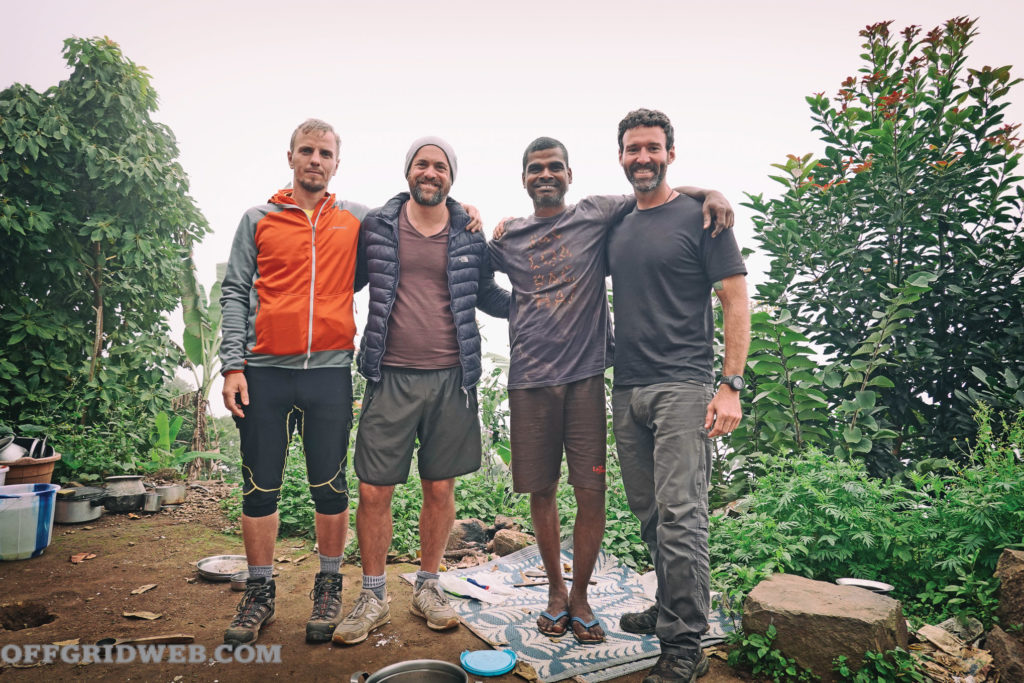 Above: Bucky stands with friends next to a retired scientist in Vattakanal, India. The gentleman kindly invited Bucky and his companions into his home for coffee and conversation.
Above: Bucky stands with friends next to a retired scientist in Vattakanal, India. The gentleman kindly invited Bucky and his companions into his home for coffee and conversation.
Is there anything else you would like to pass along to anyone reading this?
Bucky Pratt: I would tell people, just be open-minded and be willing to try new things. I have to say this quote. It’s by Pico Iyer: “We travel, initially, to lose ourselves; and we travel, next, to find ourselves. We travel to open our hearts and eyes and learn more about the world than our newspapers will accommodate. We travel to bring what little we can, in our ignorance and knowledge, to those parts of the globe whose riches are differently dispersed. And we travel, in essence, to become young fools again — to slow time down and get taken in, and fall in love once more.”
I feel like we need to try slowing down. Life does not need to be as busy and hectic as it’s made out to be. Screw the rat race, man. Travel should be a thing where you slow down smell the roses. And I don’t know, I feel like it’s just so built into our DNA to move around. The instinct to explore and see what’s over the next hill. I just tell people, you know, find something, and go for it. Don’t be scared of the unknown, instead embrace the fear of the unknown and dive in. Growth is found in the uncomfortable situations.
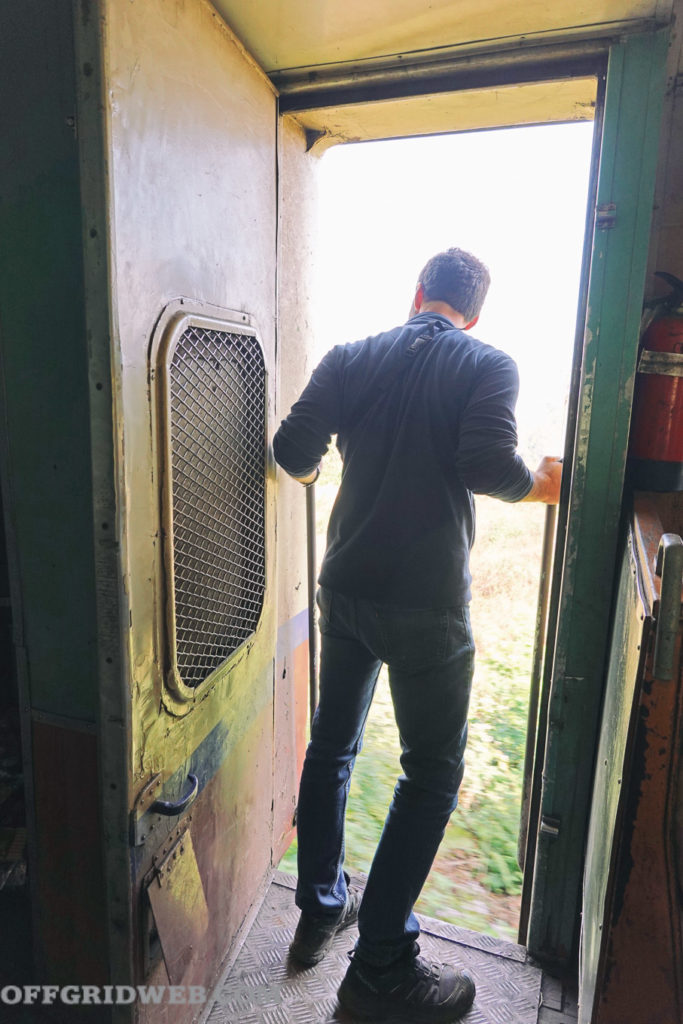 Above: Watching the ground get further away while crossing the Goteik viaduct while en route to Mandalay from Hsipaw, Myanmar.
Above: Watching the ground get further away while crossing the Goteik viaduct while en route to Mandalay from Hsipaw, Myanmar.
Selling off the majority of your worldly possessions to backpack the globe may or may not be for you. But the lessons learned are applicable to almost anyone, almost anywhere. They’re tried, tested, and confirmed across geographic, cultural, and socioeconomic borders. Bucky can be found on Instagram under the handle @grmln_global for more advice and introspection from around the world.
Photos Courtesy of Bucky Pratt and Alexandra Vautin (@alvautin.media)
 STAY SAFE: Download a Free copy of the OFFGRID Outbreak Issue
STAY SAFE: Download a Free copy of the OFFGRID Outbreak Issue
No Comments